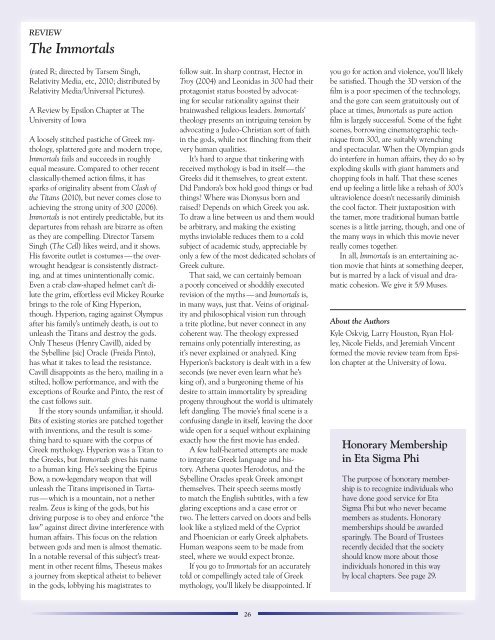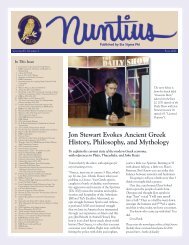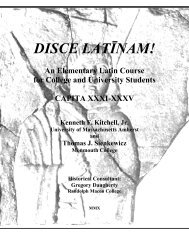In the Land of the Sibyl - Monmouth College
In the Land of the Sibyl - Monmouth College
In the Land of the Sibyl - Monmouth College
You also want an ePaper? Increase the reach of your titles
YUMPU automatically turns print PDFs into web optimized ePapers that Google loves.
REVIEW<br />
The Immortals<br />
(rated R; directed by Tarsem Singh,<br />
Relativity Media, etc, 2010; distributed by<br />
Relativity Media/Universal Pictures).<br />
A Review by Epsilon Chapter at The<br />
University <strong>of</strong> Iowa<br />
A loosely stitched pastiche <strong>of</strong> Greek mythology,<br />
splattered gore and modern trope,<br />
Immortals fails and succeeds in roughly<br />
equal measure. Compared to o<strong>the</strong>r recent<br />
classically-<strong>the</strong>med action films, it has<br />
sparks <strong>of</strong> originality absent from Clash <strong>of</strong><br />
<strong>the</strong> Titans (2010), but never comes close to<br />
achieving <strong>the</strong> strong unity <strong>of</strong> 300 (2006).<br />
Immortals is not entirely predictable, but its<br />
departures from rehash are bizarre as <strong>of</strong>ten<br />
as <strong>the</strong>y are compelling. Director Tarsem<br />
Singh (The Cell) likes weird, and it shows.<br />
His favorite outlet is costumes — <strong>the</strong> overwrought<br />
headgear is consistently distracting,<br />
and at times unintentionally comic.<br />
Even a crab claw-shaped helmet can’t dilute<br />
<strong>the</strong> grim, effortless evil Mickey Rourke<br />
brings to <strong>the</strong> role <strong>of</strong> King Hyperion,<br />
though. Hyperion, raging against Olympus<br />
after his family’s untimely death, is out to<br />
unleash <strong>the</strong> Titans and destroy <strong>the</strong> gods.<br />
Only Theseus (Henry Cavill), aided by<br />
<strong>the</strong> Sybelline [sic] Oracle (Freida Pinto),<br />
has what it takes to lead <strong>the</strong> resistance.<br />
Cavill disappoints as <strong>the</strong> hero, mailing in a<br />
stilted, hollow performance, and with <strong>the</strong><br />
exceptions <strong>of</strong> Rourke and Pinto, <strong>the</strong> rest <strong>of</strong><br />
<strong>the</strong> cast follows suit.<br />
If <strong>the</strong> story sounds unfamiliar, it should.<br />
Bits <strong>of</strong> existing stories are patched toge<strong>the</strong>r<br />
with inventions, and <strong>the</strong> result is something<br />
hard to square with <strong>the</strong> corpus <strong>of</strong><br />
Greek mythology. Hyperion was a Titan to<br />
<strong>the</strong> Greeks, but Immortals gives his name<br />
to a human king. He’s seeking <strong>the</strong> Epirus<br />
Bow, a now-legendary weapon that will<br />
unleash <strong>the</strong> Titans imprisoned in Tartarus<br />
— which is a mountain, not a ne<strong>the</strong>r<br />
realm. Zeus is king <strong>of</strong> <strong>the</strong> gods, but his<br />
driving purpose is to obey and enforce “<strong>the</strong><br />
law” against direct divine interference with<br />
human affairs. This focus on <strong>the</strong> relation<br />
between gods and men is almost <strong>the</strong>matic.<br />
<strong>In</strong> a notable reversal <strong>of</strong> this subject’s treatment<br />
in o<strong>the</strong>r recent films, Theseus makes<br />
a journey from skeptical a<strong>the</strong>ist to believer<br />
in <strong>the</strong> gods, lobbying his magistrates to<br />
follow suit. <strong>In</strong> sharp contrast, Hector in<br />
Troy (2004) and Leonidas in 300 had <strong>the</strong>ir<br />
protagonist status boosted by advocating<br />
for secular rationality against <strong>the</strong>ir<br />
brainwashed religious leaders. Immortals’<br />
<strong>the</strong>ology presents an intriguing tension by<br />
advocating a Judeo-Christian sort <strong>of</strong> faith<br />
in <strong>the</strong> gods, while not flinching from <strong>the</strong>ir<br />
very human qualities.<br />
It’s hard to argue that tinkering with<br />
received mythology is bad in itself — <strong>the</strong><br />
Greeks did it <strong>the</strong>mselves, to great extent.<br />
Did Pandora’s box hold good things or bad<br />
things Where was Dionysus born and<br />
raised Depends on which Greek you ask.<br />
To draw a line between us and <strong>the</strong>m would<br />
be arbitrary, and making <strong>the</strong> existing<br />
myths inviolable reduces <strong>the</strong>m to a cold<br />
subject <strong>of</strong> academic study, appreciable by<br />
only a few <strong>of</strong> <strong>the</strong> most dedicated scholars <strong>of</strong><br />
Greek culture.<br />
That said, we can certainly bemoan<br />
a poorly conceived or shoddily executed<br />
revision <strong>of</strong> <strong>the</strong> myths — and Immortals is,<br />
in many ways, just that. Veins <strong>of</strong> originality<br />
and philosophical vision run through<br />
a trite plotline, but never connect in any<br />
coherent way. The <strong>the</strong>ology expressed<br />
remains only potentially interesting, as<br />
it’s never explained or analyzed. King<br />
Hyperion’s backstory is dealt with in a few<br />
seconds (we never even learn what he’s<br />
king <strong>of</strong>), and a burgeoning <strong>the</strong>me <strong>of</strong> his<br />
desire to attain immortality by spreading<br />
progeny throughout <strong>the</strong> world is ultimately<br />
left dangling. The movie’s final scene is a<br />
confusing dangle in itself, leaving <strong>the</strong> door<br />
wide open for a sequel without explaining<br />
exactly how <strong>the</strong> first movie has ended.<br />
A few half-hearted attempts are made<br />
to integrate Greek language and history.<br />
A<strong>the</strong>na quotes Herodotus, and <strong>the</strong><br />
Sybelline Oracles speak Greek amongst<br />
<strong>the</strong>mselves. Their speech seems mostly<br />
to match <strong>the</strong> English subtitles, with a few<br />
glaring exceptions and a case error or<br />
two. The letters carved on doors and bells<br />
look like a stylized meld <strong>of</strong> <strong>the</strong> Cypriot<br />
and Phoenician or early Greek alphabets.<br />
Human weapons seem to be made from<br />
steel, where we would expect bronze.<br />
If you go to Immortals for an accurately<br />
told or compellingly acted tale <strong>of</strong> Greek<br />
mythology, you’ll likely be disappointed. If<br />
you go for action and violence, you’ll likely<br />
be satisfied. Though <strong>the</strong> 3D version <strong>of</strong> <strong>the</strong><br />
film is a poor specimen <strong>of</strong> <strong>the</strong> technology,<br />
and <strong>the</strong> gore can seem gratuitously out <strong>of</strong><br />
place at times, Immortals as pure action<br />
film is largely successful. Some <strong>of</strong> <strong>the</strong> fight<br />
scenes, borrowing cinematographic technique<br />
from 300, are suitably wrenching<br />
and spectacular. When <strong>the</strong> Olympian gods<br />
do interfere in human affairs, <strong>the</strong>y do so by<br />
exploding skulls with giant hammers and<br />
chopping fools in half. That <strong>the</strong>se scenes<br />
end up feeling a little like a rehash <strong>of</strong> 300’s<br />
ultraviolence doesn’t necessarily diminish<br />
<strong>the</strong> cool factor. Their juxtaposition with<br />
<strong>the</strong> tamer, more traditional human battle<br />
scenes is a little jarring, though, and one <strong>of</strong><br />
<strong>the</strong> many ways in which this movie never<br />
really comes toge<strong>the</strong>r.<br />
<strong>In</strong> all, Immortals is an entertaining action<br />
movie that hints at something deeper,<br />
but is marred by a lack <strong>of</strong> visual and dramatic<br />
cohesion. We give it 5/9 Muses.<br />
About <strong>the</strong> Authors<br />
Kyle Oskvig, Larry Houston, Ryan Holley,<br />
Nicole Fields, and Jeremiah Vincent<br />
formed <strong>the</strong> movie review team from Epsilon<br />
chapter at <strong>the</strong> University <strong>of</strong> Iowa.<br />
Honorary Membership<br />
in Eta Sigma Phi<br />
The purpose <strong>of</strong> honorary membership<br />
is to recognize individuals who<br />
have done good service for Eta<br />
Sigma Phi but who never became<br />
members as students. Honorary<br />
memberships should be awarded<br />
sparingly. The Board <strong>of</strong> Trustees<br />
recently decided that <strong>the</strong> society<br />
should know more about those<br />
individuals honored in this way<br />
by local chapters. See page 29.<br />
26
















